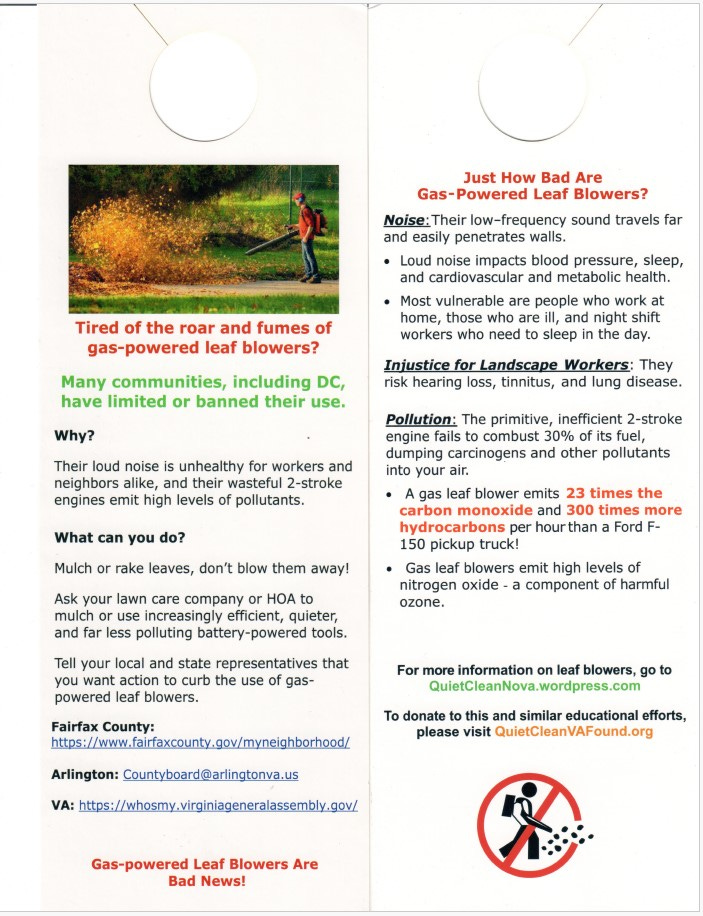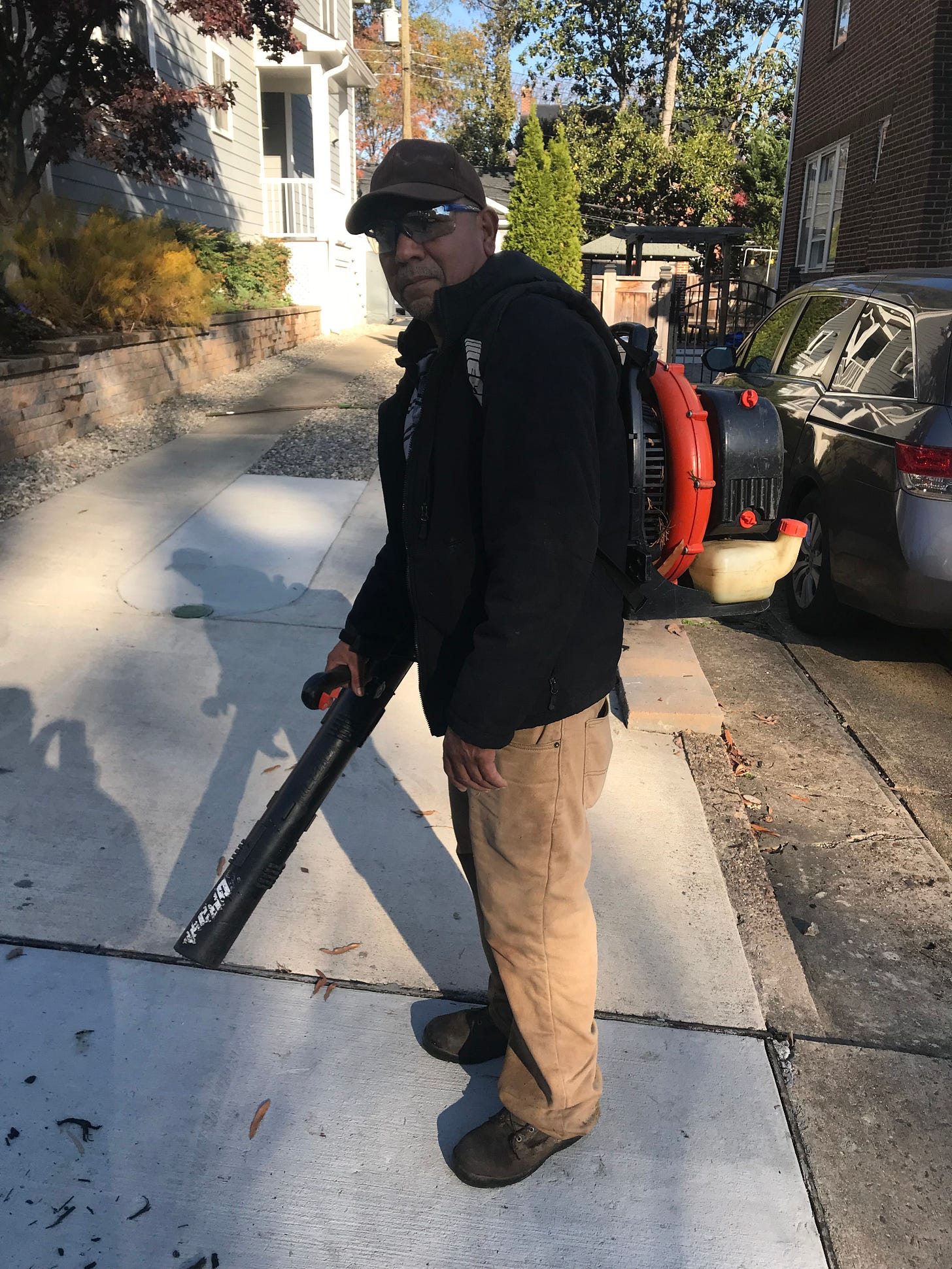Will Alexandria Ban Gas-Powered Leaf Blowers?
Momentum builds for city and state action on leaf blowers powered by two-stroke gasoline engines
Leaves are falling from Alexandria’s trees, but how to manage the accumulated leaves has become increasingly controversial.
The District of Columbia, Montgomery County, Maryland, Miami Beach, Florida, Evanston, Illinois, and the state of California have banned the use of gas-powered leaf blowers.
The movement against gas-powered leaf blowers is driven by residents, some of whom work through Quiet Clean NOVA, a nonprofit that has advocated against gas-powered leaf blowers in several Northern Virginia communities.
Quiet Clean NOVA’s website can be seen
Quiet Clean Nova’s Change.org online petition to the General Assembly advocating such a ban, which has attracted over 2,000 signatures, is
Alexandria enacted a revised noise control ordinance that went into effect on January 1, 2022. According to the city’s website, alexandriava.gov, the City Council’s adoption of the revised noise ordinance “…culminated in a comprehensive effort to make the City’s noise control ordinance legally enforceable and more protective of residential areas, while allowing reasonable vibrancy in the business corridors during business hours.”
The essential restriction of the noise ordinance is, “The decibel standard for commercial use is increased to 65 dB(A) for daytime hours of 7 a.m. to 11 p.m. while the nighttime standard remains at 60(dB(A).”
Numerous studies show that gas-powered leaf blowers dramatically exceed the city’s daytime decibel limit. For example, according to a 2017 National Institutes of Health study, the sound pressure levels of gas-powered leaf blowers can exceed 95 decibels at the ear of the operator.
Samantha Ahdoot, an Alexandria pediatrician who works from home two days a week, regularly hears gas-powered leaf blowers from a neighboring property. Her husband, a physician, hears gas-powered leaf blowers at the hospital where he works. Ahdoot said, “We’ve given the soundscape of the city over to these machines.” Ahdoot recommends listening to classical music as an antidote to gas-powered leaf blowers.
The Venerable and Powerful Two-Stroke Engine
Most gas-powered leaf blowers are powered by two-stroke air cooled single-cylinder engines, a power plant for handheld machinery for decades. These engines are powerful for their size and they have historically been preferred by landscaping companies and power-obsessed homeowners. Gas-powered leaf blowers typically run on a mixture of oil and gas. These engines are inefficient and emit harmful pollutants.
Gas-powered leaf blowers also emit sound in lower frequencies that travel over long distances and penetrate walls and windows. Electric leaf blowers are quieter and produce sound that dissipates over a shorter distance according to a Consumer Reports study.
Chemical and Climate-Warming Emissions
According to 2020 data from the U.S. Environmental Protection Agency, gas-powered lawn equipment emitted nearly 22,000 tons of fine particulates or as much pollution as would be produced in one year by 234 million typical cars. Such equipment emits more than 68,000 tons of nitrogen oxides and 350,000 tons of volatile organic compounds, the two chemical components of ground-level ozone which triggers asthma attacks. Fossil fuel-powered lawn equipment also emits substantial quantities of carbon dioxide.
Resident and Business Perspectives
Susan Davis, a retired teacher and marketing executive, has attended meetings, gathered petition signatures, distributed Quiet Clean NOVA’s door hang-tags, and urged her condominium association to take a position against gas-powered leaf blowers.
In addition to the noise and pollution generated by gas-powered leaf blowers, Davis points to the disturbance of natural microsystems—bugs, worms, etc.—caused by leaf blowers and the fertilizing effect of leaving leaves in place. Davis said, “Every time you use a leaf blower, you are blowing away a universe of life.”
Old Town residents have been sensitive to the reverberating noise of gas-powered leaf blowers in the area’s compact environment. Davis suggests that city governments, school systems, churches and hospitals could lead the way by transitioning to battery-powered equipment for landscape maintenance activities.
Frank Diaz runs Josephine’s Garden, a lawn and landscaping company with numerous Alexandria clients. Diaz focused on the effect of gas-powered leaf blowers on his employees who operate them nearly every day in leaf season.
Diaz said in a text message that one of his clients, an EPA official, advised him “…2 cycle engine gas blowers do not break down the emissions and the fumes are super dangerous to humans who use them. That alone is reason enough to switch to non gas!”
Diaz described the business adjustments necessary to discontinue using gas-powered leaf blowers:
[I]n Alexandria I have some clients that we have switched to battery charged blowers. The result is that we have to do a bit more raking and always be charging the batteries. It adds a bit more time to our work and therefore costs clients a bit more but they don’t seem to mind. I’m all for changing!
The Politics of General Assembly Authorization
Virginia follows the Dillon Rule, meaning that cities and counties can exercise only powers explicitly authorized or delegated to them by the state.
The National League of Cities describes the Dillon Rule this way:
Dillon's Rule is derived from a written decision by Judge John F. Dillon of Iowa in 1868. It is a cornerstone of American municipal law. It maintains that a political subdivision of a state is connected to the state as a child is connected to a parent. Dillon's Rule is used in interpreting state law when there is a question of whether or not a local government has a certain power. Dillon's Rule narrowly defines the power of local governments.
The Dillon Rule has allowed state governments to constrain municipalities in various ways. State legislatures in states following the Dillon Rule have voided municipal minimum wage laws, prevented local plastic bag bans, barred the municipal regulation of ride-sharing services and voided local family leave policies.
Alexandria elected to seek authority from the General Assembly for municipalities to regulate gas-powered leaf blowers even though the plain language of the noise ordinance seems to enable the city to regulate them.
Assistant City Manager and Legislative Director Sarah Graham Taylor said, “It has to do with enforcement.” She thinks the request for authority from the General Assembly was driven in part by the difficulties of enforcing the noise ordinance—a violation of the noise ordinance requires measuring the decibel level of an activity in progress. In contrast, if localities had authority to regulate gas-powered leaf blowers each municipality could do so as it wished.
In a November 15 message, Alexandria Mayor Justin Wilson confirmed that he expected that authority to regulate gas-powered leaf blowers would be included in the city’s package of legislative requests to the General Assembly for its 2024 session, as it was for the 2022 session.
In the 2022 General Assembly session, Delegate Kaye Kory and Delegate Elizabeth Bennett-Parker co-patroned HB 1337 to give localities the authority to regulate gas-powered leaf blowers. Senator Barbara Favola introduced a similar bill in the Senate.
HB 1337 died, or was “laid on the table,” in a 5-4 subcommittee vote.
The 19th century Prussian leader, Otto Von Bismarck, is reputed to have said, “Laws are like sausages. It is best not to see them being made.” The subcommittee debate on the bill in February 2022 was brief. The debate can be seen
Senator Favola was re-elected earlier this month. Delegate Kory did not run for re-election. The effects of the new Democratic majorities in the House of Delegates and the Senate remain to be seen, but legislative action permitting cities and counties to regulate gas-powered leaf blowers will need a sponsoring member or members of the House of Delegates.
In a November 17 message, Kelsey Wright, Delegate Bennett-Parker’s Chief of Staff, wrote:
We believe another member is introducing this bill and Delegate Bennett-Parker will support their efforts. Delegate Bennett-Parker supports allowing localities to regulate gas-powered leaf blowers and will continue to co-patron such legislation.








